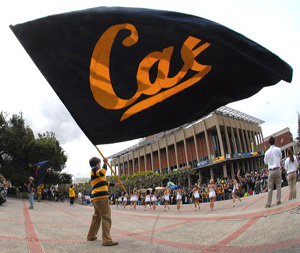Cal Day Lectures by Berkeley Lab Scientists
Go here for a full program of activities.
 9–9:30 am | 105 Stanley Hall
9–9:30 am | 105 Stanley Hall
Interested in medical school? Find out how a bioengineering degree is an excellent pre-med education.
Sanjay Kumar
9–10 am | 141 McCone Hall
Hear an oceanographer describe his experiences at sea with robotic exploration of the ocean-atmospheric carbon cycle.
Jim Bishop
10–11 am | 4 LeConte Hall
Every year, Berkeley scientists add more to what we know about the universe and how it works. Hear about the past year's exciting breakthroughs, and ask questions about scientific discovery at Cal.
Bob Jacobsen
10–11 am | 3113 Etcheverry Hall
The ABCs of Nuclear Science: Watch demonstrations to learn the basics of radioactivity and nuclear reactions.
Eric Norman
11 am–noon | 4 LeConte Hall
What Is the Large Hadron Collider? It's the world's largest and most powerful particle accelerator. Hear how it works and discover the exciting things it might reveal about our amazing universe.
Marjorie Shapiro
11 am–2 pm | McCone Hall, entrance & lobby
See live marine animals, and watch students demonstrate beach-bucket science and other projects.
Lynn Ingram
Noon–12:45 pm | 1 LeConte Hall
Sparks and explosions! These jaw-dropping lab demonstrations -- from merely amazing to simply spectacular — are favorites in Berkeley physics classes.
Howard Shugart
Noon–1 pm | 4 LeConte Hall
Faculty advisers, staff, and current students present an overview of the educational and research opportunities for physics students.
Frances Hellman
Noon–1 pm | 141 McCone Hall
How Global Climate Change Will Affect the Oceans: Warmer surface waters, rising sea levels, more storms, and increased carbon dioxide — all will have an impact on marine ecosystems, coasts, islands, estuaries, and wetlands.
Lynn Ingram
Noon–2 pm | Observatory Hill, west of McCone Hall
Carbon Credits for Your Lawn? If your lawn is green, does it mean it's soaking up carbon dioxide? Use a gas-analyzer system to measure photosynthesis and respiration on a grassy lawn.
Robert Rhew
1–2 pm | Bechtel Engineering Center, Sibley Auditorium
From early disease detection, to faster computers, to clean energy production — nanotechnology projects are under way in a dozen Berkeley science and engineering departments.
R. Ramesh
1–1:45 pm | 1 LeConte Hall
Sparks and explosions! These jaw-dropping lab demonstrations — from merely amazing to simply spectacular — are favorites in Berkeley physics classes.
Bob Jacobsen
1–2 pm | 3113 Etcheverry Hall
The newest reactors are being designed for enhanced safety, security, sustainability, and economics. Hear about Berkeley's work toward high-temperature reactors that can support production of base-load electricity, low-carbon fuels, and desalinated water.
Per Peterson
1–3 pm | 261 Donner Laboratory
Using high-powered microscopes, engineers can remodel bone surfaces at the molecular level. See how it's done!
Seung-Wuk Lee
1:30–2 pm | 390 Hearst Memorial Mining Building
Over the past five years a worldwide collaboration has led to the installation of the finest electron microscope at Berkeley. Hear how it happened, and the science it took to achieve it.
Andrew Minor
2–3 pm | 4 LeConte Hall
Fascinated by rockets, stars, and the Big Bang? See footage of the April launch of this satellite and hear how it could soon give us a wealth of information about the evolution and future of the universe.
Anze Slosar
2:30–3 pm | 390 Hearst Memorial Mining Building
What materials do we use to convert light and heat into electricity (and vise versa)? Learn about this transformation, how it works, and how we can make it work better.
Junqiao Wu
3–3:30 pm | 390 Hearst Memorial Mining Building
Look around. Nearly everything is made of soft materials, from the synthetic (plastics or clothing) to the natural (your DNA or hair). Master manipulators, materials scientists rearrange molecules to generate the best soft materials for nano- and biotechnology.
Ting Xu
3–4 pm | 141 McCone Hall
Computer visualizations provide a more intuitive way to understand Earth's changing climate. See how.
John Chiang
